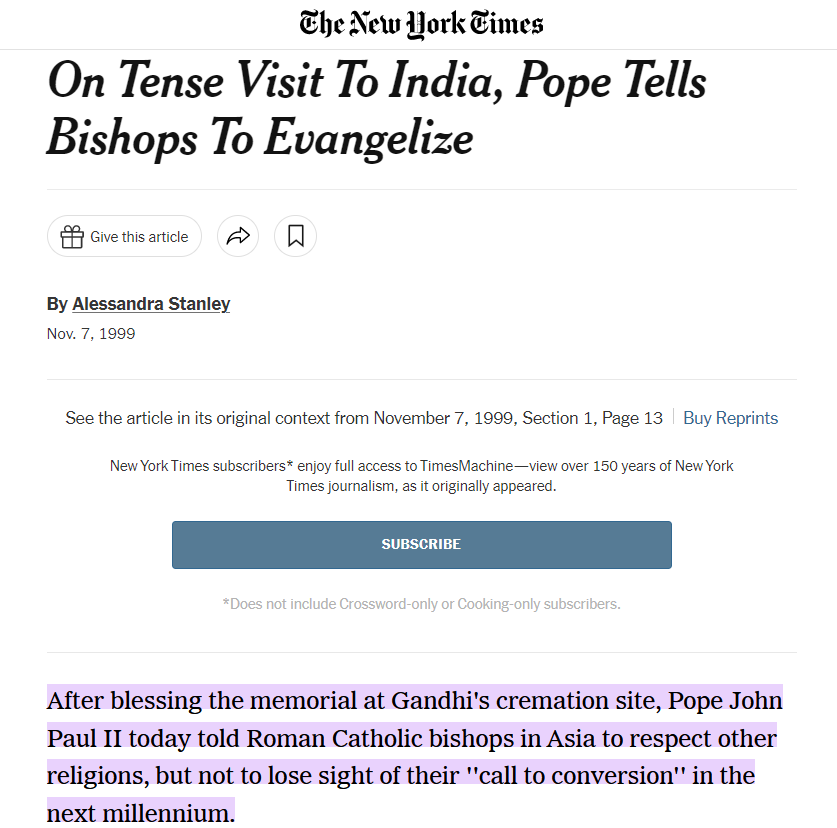A little bit about Swami Sarvapriyananda
I've listened to Swami Sarvapriyananda of the Vedanta Society of New York for the last couple of years. His talks on Vedanta, Katha Upanishad, Yoga, and various other topics are a very important source to not only introductions to Hindu spiritual philosophy but help one to dive deep into this sea of knowledge with an anchor to guide as one unravels the knowledge.
He talks about universal acceptance as well as how the Hindu mind accepts other religions as several paths leading to the 'one' truth. He is rooted in his philosophy of Advaita Vedanta (non-dualism). He rarely talks about politics in his lectures and frequently talks about the acceptance of various spiritual paths leading to the same truth.
A westerner's myopic view of Hindu nationalism
In a recent speech, a question was asked from the audience; "how the current "Hindu nationalism" can be reconciled with the message of universal acceptance that Swami Ji mentioned in his talk on Advaita Vedanta?"
I was expecting a politically correct reply that would stay away from contentiousness. And it wouldn't have been wrong for Swami Ji to reply in such a manner because a religious gathering is not the right place to discuss politically motivated questions. But since the question was asked, loaded with certain presumptions, and connotations that are popular among the left-liberal Indian media it had to be dealt with sincerity, and respect for history.
Swami Ji's response
And his response did just that, most efficiently. I've transliterated his response and the original response is available here. Swami Ji responds by saying:
To a naïve western mind, Narendra Modi's government is always portrayed as a right-wing Hindu-nationalist rule. If you go by the likes of BBC, NY Times, WaPo, etc. the rule of law and a rule-based government no longer exists in India. The western media intentionally creates a 'strawman monster' so its colonial, racial and left biases can continue to have a whipping boy.
India's colonial past (times 2)
Yet, this standpoint conveniently ignores the long history of Islamic (or middle-eastern) colonialism and British colonialism that has gifted India with its chaotic democracy that's a mix of minority appeasement and state control of majority institutions. The partition of India was not just the culmination of the freedom movement but was also the end result of the 'great game' by fading colonial Britain to divide India based on religion.
The dharmic view of Hinduism (Sanatana Dharma) is assimilating
Indic scriptures do not talk about otherization in any fashion. There is no insistence on "one and only one truth" and in fact, divergent views are accepted and debated to make informed rebuttals. There is no attempt in Indic scriptures (including Sanātana 'Hindu' Dharma, Jain, and Buddhist) to belittle other spiritual philosophies as heathen or subpar. Although the modern meaning of 'heathen' has been veneered to make it less controversial, however, the true meaning is quite evident in colonial writings of the like of William Wilberforce who talks about the 'moral improvement' of natives of British colonies. And the iconoclasm of Hindu temples as Arab and Turk invaded India multiple times is well documented by Sita Ram Goel and Prafull Goradia.
 |
| William Wilberforce Speeches |
Civilizational trauma of millenniums requires healing
It's better to ignore the whataboutery when discussing such intricate topics. The facts should be discussed as is. Yes, India's medieval and modern history is laden with violence based on religious differences. And as Prafull Goradia writes that "there exists a chasm between Hindus and Muslims in India." And a unified India needs this chasm to be filled with progress, and upliftment but reconciliation is long overdue. And it cannot be ignored that there is a violent minority (of minority) in modern India that doesn't believe in the constitution or modern judicial system and covet the eight centuries of Islamic rule as something that needs to be restored. And the proselytizing nature of Abrahamic religions adds another angle to the concern of Hindu nationalists (right).
So what would be the genuine Hindu response to this (aggression)? Is there anything in your (Hindu) tradition that says those religions are false? And yes, call it out, wherever you find aggression. I learned a lot in New York from my interaction with the Jewish community (on) how to deal with anti-Semitism.
Aggression, Otherization, and Hinduism
Swami Ji in the end implies that Sanatana Dharma (Hinduism) doesn't have the concept of justifying the falsity of other religions as part of its tenets. There is no otherization of other existing spiritual paths. There is no arrogance in "my God is one God". There is no call to arms to evangelize the world. Instead, Hinduism is probably the only spiritual path in the world that includes ontology (Vaisheshik) and epistemology (Nyaya) as part of its six schools of philosophy. Charvaka's philosophy of materialism that rejected the Veda is also debated and studied by numerous Vedic scholars. And aggression should be dealt with firmly. If India is a democracy, then it needs to be a democracy for all irrespective of religion. And an attempt by certain sections to reduce Hinduism to Brahminism using illogical claims should be rightly called out Hinduphobia - pure and simple. And we can learn a lot from the way the Jewish community dealt with anti-Semitism.


Comments
Post a Comment